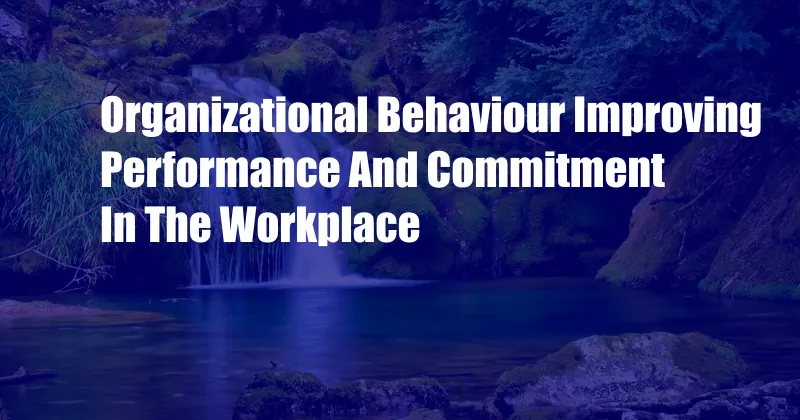
Organizational Behaviour: Enhancing Performance and Commitment in the Workplace
I vividly recall my first day at work as a fresh graduate. I was filled with enthusiasm and eager to make a positive impact. However, as days turned into weeks, I noticed a disconnect between the company’s mission and the employees’ behaviours. Some seemed unmotivated, while others engaged in unproductive gossip. This lack of alignment puzzled me, as it seemed like a lost opportunity for the organization to reach its full potential.
Intrigued by these observations, I delved into the fascinating world of organizational behaviour. I discovered that it holds the key to understanding the complex dynamics within the workplace. By unlocking these insights, organizations can craft strategies to improve performance, enhance commitment, and cultivate a thriving work environment.
The Significance of Organizational Behaviour
Organizational behaviour encompasses the study of the individual, group, and organizational factors that influence employee behaviours and attitudes. It delves into the psychological, social, and environmental aspects that shape work performance, job satisfaction, and organizational culture. Understanding these factors enables organizations to create workplaces that foster productivity, innovation, and employee well-being.
Organizations that embrace organizational behaviour principles gain a competitive advantage in today’s challenging business landscape. By aligning employee behaviours with organizational goals, they can increase productivity, reduce turnover, enhance customer satisfaction, and drive innovation. It empowers leaders to create a positive work environment where employees feel valued, motivated, and committed to the organization’s success.
Understanding the Determinants of Organizational Behaviour
Numerous factors contribute to organizational behaviour, including:
- Individual Factors: Personality traits, values, skills, and abilities of employees.
- Group Factors: Dynamics within teams, communication, and leadership styles.
- Organizational Factors: Company culture, policies, structure, and reward systems.
- Environmental Factors: External influences such as the economy, competition, and technological advancements.
By understanding the interplay of these factors, organizations can develop tailored interventions to address specific challenges and enhance employee performance and commitment.
Enhancing Performance through Organizational Behaviour
Organizations can leverage organizational behaviour principles to improve performance by:
- Creating a motivating work environment: Establishing clear goals, providing regular feedback, and rewarding high performance fosters a sense of purpose and achievement.
- Harnessing teamwork and collaboration: Encouraging effective communication, cooperation, and support within teams can enhance productivity and innovation.
- Promoting learning and development: Investing in employee training and development opportunities improves skills, knowledge, and adaptability, leading to better performance.
- Empowering employees: Granting autonomy, decision-making authority, and opportunities for growth fosters engagement and ownership of work.
- Recognizing and rewarding contributions: Acknowledging and rewarding employee achievements, big and small, boosts morale and recognition.
Fostering Commitment through Organizational Behaviour
Organizational behaviour also plays a crucial role in fostering employee commitment. By addressing the following factors, organizations can increase commitment levels:
- Creating a positive work culture: A supportive, respectful, and inclusive workplace fosters a sense of belonging and loyalty.
- Providing meaningful work: Assigning employees tasks that align with their interests and values increases job satisfaction and commitment.
- Offering opportunities for career growth: Clear career paths and opportunities for advancement show employees that the organization values their long-term growth and development.
- Empowering employees to make a difference: Allowing employees to contribute to decision-making and organizational initiatives creates a sense of purpose and commitment.
- Balancing work-life integration: Providing flexible work arrangements, employee assistance programs, and support for personal growth fosters a healthy work-life balance, contributing to overall well-being and commitment.
Tips and Expert Advice for Enhancing Organizational Behaviour
Based on research and expert insights, consider the following tips to improve organizational behaviour:
- Foster transparency and communication: Open and honest communication channels between leaders and employees build trust and reduce uncertainty.
- Be mindful of office culture: Pay attention to the daily interactions, norms, and social dynamics of employees to identify areas for improvement.
- Encourage employee feedback: Regularly seek employee input through surveys, feedback sessions, or suggestion boxes to understand their concerns and suggestions.
- Reward and recognize performance: Design a reward system that acknowledges and celebrates specific behaviours and contributions that align with organizational goals.
- Provide opportunities for employee development: Invest in training, mentoring, and coaching programs to develop employee skills, knowledge, and leadership abilities.
By implementing these practices, organizations can create a positive work environment where employees feel valued, engaged, and motivated to perform their best. This ultimately leads to increased productivity, reduced turnover, and enhanced organizational success.
FAQs on Organizational Behaviour
Q: How can managers apply organizational behaviour principles in their daily work?
A: Managers can use organizational behaviour principles to enhance communication, motivate employees, build effective teams, and create a positive work environment. By understanding the factors that influence employee behaviours, they can tailor their leadership style to improve performance and commitment.
Q: What are the challenges in managing organizational behaviour in a diverse workforce?
A: Managing a diverse workforce presents challenges in terms of cultural differences, communication styles, work values, and expectations. Managers need to be mindful of these differences and create an inclusive work environment where all employees feel respected and valued.
Q: How can organizations use technology to improve organizational behaviour?
A: Technology can facilitate communication, collaboration, and learning. By using virtual platforms for remote work, social networking tools for employee engagement, and performance management software, organizations can enhance organizational behaviour outcomes.
Conclusion
Organizational behaviour is a dynamic and multifaceted discipline that provides invaluable insights into the complexities of the workplace. By understanding and applying its principles, organizations can create environments where employees thrive, perform at their best, and develop a strong commitment to the organization’s success. The tips, expert advice, and FAQs provided in this article serve as practical steps for organizations to enhance organizational behaviour and reap the benefits of a motivated and engaged workforce.
Are you interested in learning more about organizational behaviour and its impact on workplace performance and commitment? Share your thoughts and questions in the comments section below.